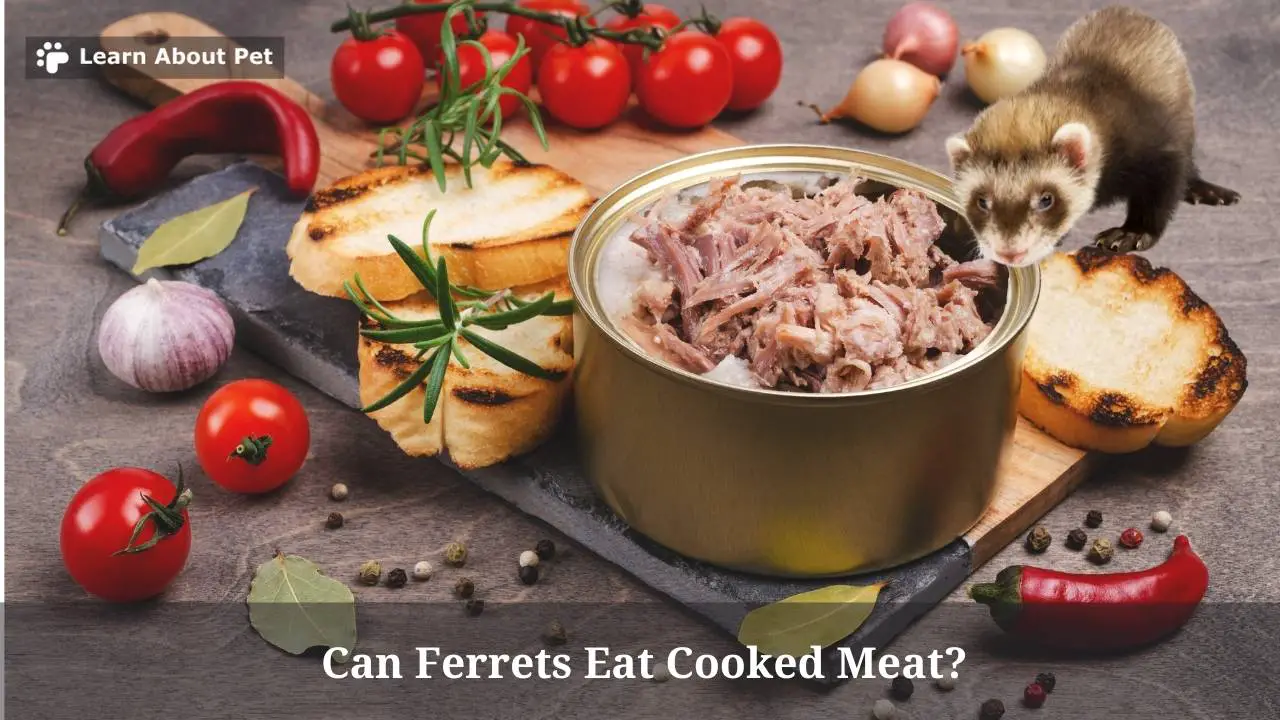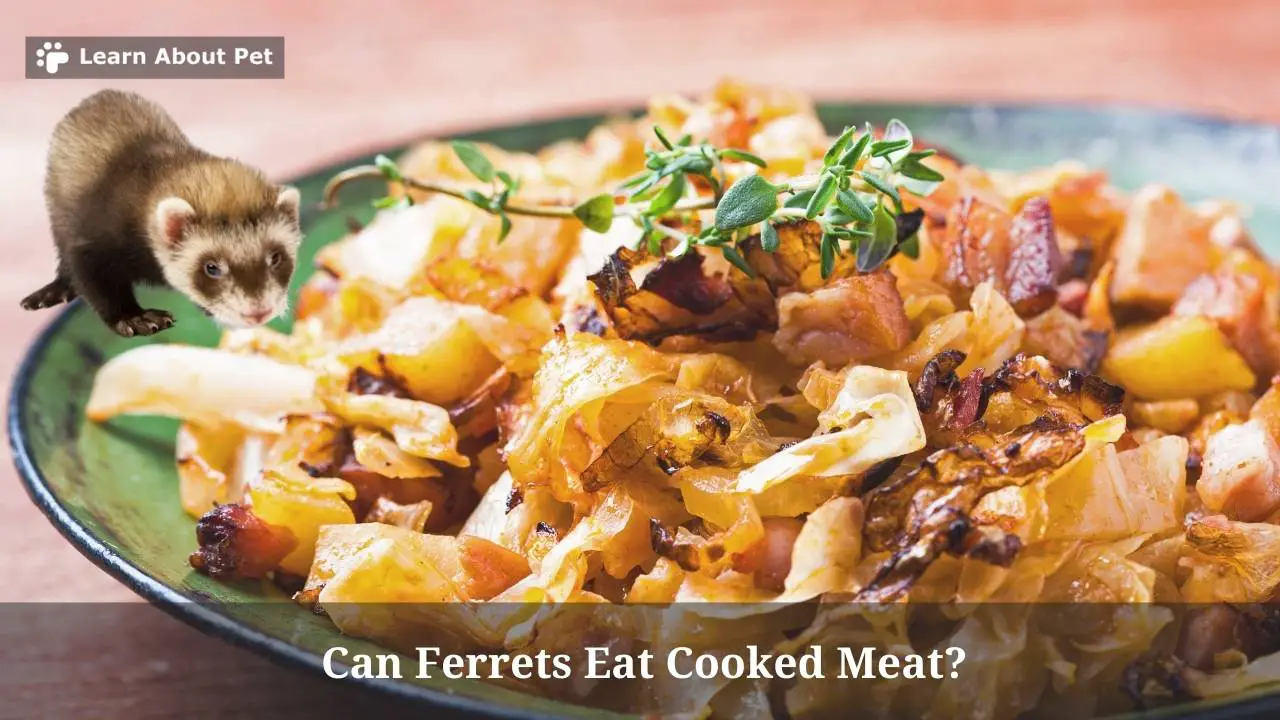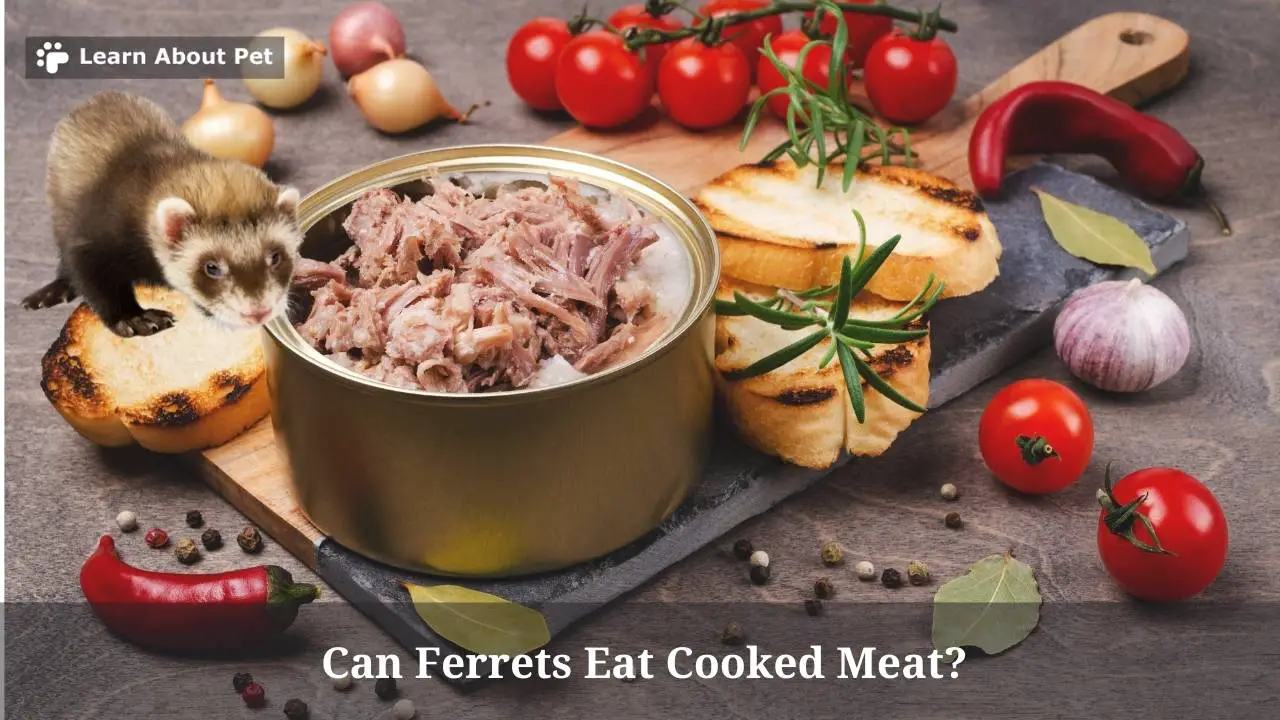Ferret is one of the small carnivores with unique feeding requirements. Ferrets are carnivores that cannot get nutrients from vegetable matter and have a small digestive system that passes food very quickly.
It is why ferrets need high animal protein and fat but low in fiber. If ferret food is meat-based food, what about ferrets eating cooked meat?
Can ferrets eat cooked meat? Ferrets are not recommended to eat cooked meat because many mixed ingredients can harm their health. It’s best to give raw or unseasoned cooked meat so the ferret can get all the benefits of protein and fat.

Cooked meat is a meat-based food, but there are a few things to think about before owners give it to ferrets. Let’s read this article to the end.
Can Ferrets Eat Cooked Meat?
Ferrets can eat raw or cooked meat but pay attention to how you cook the meat and what the ingredients are. Cooked meat is made with a mixture of spices, such as salt, garlic, or onion. Cooking meat can remove a lot of nutrients that would otherwise be beneficial for the ferret’s health.
It’s okay if you give it unseasoned cooked meat. If you force your ferret to eat cooked meat with a lot of seasoning, it can develop tooth decay or addiction to junk food.
What Kinds Of Meat Can Ferrets Eat?
People want to know what meat can ferrets eat because they are obligate carnivores. Raw meat such as prey, insects, or birds is better than you give other forms like cooked or boiled.
Ferrets can eat kitten food, baby food, or ferret pellets with high meat protein. Ferret’s diet should contain 32-38% protein and 15-20% fat.
Good quality meat can be purchased at many pet stores or reputable retailers. Don’t try to find raw meat yourself because we don’t know whether wild animals have parasites or not.
Can Ferrets Eat Cooked Chicken?
When we know ferrets eat meat-based food, can ferrets eat cooked chicken meat? You can give the ferret raw chicken meat or cooked along with pellets. Choose dry food as the ferret’s essential staple to keep their teeth clean.
Ferrets should not overeat cooked meat with a lot of seasoning. Chicken meat is excellent for ferrets but should not be mixed with too much seasoning as it can worsen the ferret’s health.
Do Ferrets Eat Meat?
Yes, ferrets like many types of meat, including lamb, chicken, pigeons, turkey necks, rabbit, and animal bones. Ferret owners provide cooked ferret food because they want to bring a variety of food.
If the ferret continues to eat food that contains a lot of seasoning, then the ferret can develop diarrhea, tooth decay, and other fatal conditions.
Can Ferrets Eat Cooked Bones?
Any cooked meat will be less nutritious than in raw form. The protein will be cooked off while the ferret needs protein and nutrients that must meet its daily needs.
Ferrets can only eat bones with the rest of the meat in raw form because cooked bones are not safe for ferret health.
Cooked bones can break easily and become a choking hazard in the ferret’s throat or intestinal blockage. Apart from cooked bones, ferrets cannot eat cooked meat smoothly because it is difficult to digest.
Raw meat has good bacteria that can launch the ferret’s digestive system, which can be reduced if it goes through the frying or boiling process.
Can Ferrets Eat Cooked Eggs?
Ferrets can only eat raw eggs or cooked eggs as a treat. Do not give eggs in the primary diet because it can cause constipation. The limit for giving cooked eggs to ferrets is once a week or twice.
Look at the ferret’s reaction when eating eggs. If there are upset stomach symptoms, don’t continue to give eggs another time.
Unlike meat, cooked eggs provide a healthy amount of fat, protein, and essential vitamins. Ferret likes the taste of eggs, and the soft texture is easy to digest.
Can Ferrets Eat Cooked Minced Meat?
Ferrets can choose their food if it is not to their liking. Ferrets need organ meat and bone to meet their diet. Raw minced meat or ground meat is a ferret’s preferred choice over cooked form.
Some ferrets refuse to be given cooked ground meat or beef because it doesn’t suit their taste. Ferrets will choose raw or cooked meat with slices or the shape they eat.

Can I Feed My Ferret Cooked Meat?
It depends on what ingredients you will mix to make cooked meat. Ferrets will have no problem eating cooked meat as long as there is no excessive seasoning to avoid the possibility of food ingredients that are not good for the ferret’s health.
Raw meat is the best choice for ferret food because it is pure and doesn’t have any seasoning.
If you want to give cooked meat, ensure you cook it unseasoned to avoid the ferret getting addicted to junk food and not getting the nutrients or protein it needs.
Can Ferrets Eat Cooked Beef?
Ferret love cooked beef as much as they eat raw beef. But in terms of nutrition, raw beef provides more ferret needs than cooked form.
Many owners think that cooking beef by adding seasoning will add flavor and interest to the ferret to eat, but it can harm your pet if the seasoning is too much.
Can ferrets eat cooked meat? Ferrets who eat cooked beef too often with a lot of seasoning will experience gastrointestinal problems, tooth decay, or other illnesses because many ingredients do not include protein or fat.
Can Ferrets Eat Cooked Pork?
Choose only high-quality pork for the ferret. Ferrets can eat pork without any problems if they are clean without Trichinella. If you can find a 100% good source of pork, then your ferret can eat cooked pork and get the protein and fat it needs.
Many ferret owners avoid pork meat because many parasites are dangerous if you get it from unreliable sources. Pork equals slightly dense beef. If the ferret is having trouble eating cooked pork, make sure you cut it to bite size.
Can Ferrets Eat Cooked Steak?
Raw steak is the best choice for ferrets. Cooked steak is mostly cooked using seasoning for its savor and texture. Before you give the raw steak, you must remove the grit and fat so that your ferret doesn’t have trouble eating it.
The cooked steak will reduce the nutrients in the meat or amino acids, which are essential for the ferret’s health.
Do Ferrets Eat Raw Or Cooked Meat?
The ferret meat choices should be selected based on which one provides the most protein and fat according to the ferret’s dietary needs. Ferrets can eat both, but one of these forms is better than the other.
The cooked form can remove the nutritional value or essential vitamins in meat.
You need to give raw meat because it is easier to digest, and ferrets will get maximum protein and fat values.
What Meats Can Ferrets Eat?
Ferret owners want to know what meat is allowed for their pets. If a ferret can eat cooked meat but must be unseasoned to avoid health issues, pet owners may find it safer to provide the meat in raw form.
Meat-based food is the best choice for ferrets. The table below is a list of some foods to eat and which foods to avoid.
| What ferrets can eat | What ferrets can’t eat |
| Lamb | Apple |
| Minced beef | Lima beans |
| Chicken wings | Pears |
| Mice | Spinach |
| Rats | Salt |
| Birds | Onions |
The table above shows a significant difference because ferrets as obligate predators are not allowed to eat vegetables, fruit, or plant-based food.
Final Verdict – Can Ferrets Eat Cooked Meat
Carnivorous animals need meat as their primary diet. The natural way to feed ferrets is raw meat or prey. If you want to give your ferret a balanced diet, you do not need to provide cooked meat with a lot of seasoning.

The ferret will be safe if you provide unseasoned meat although the nutritional value is still more in raw form.
Choose high-quality meat to ensure ferrets get the protein and fat they need every day. Do not use ingredients that harm the ferret’s health because ferrets prefer to eat raw meat.
As a pet lover, make sure to learn about pet more and give your pet ferret a good and comfortable life!

Welcome to Learn About Pet. My name is Rajkumar Ravichandran and I love all pets, travel, and amazing food. I write about my passion and personal experience caring for multiple pets in this blog! ❤️
Post Disclaimer
DISCLAIMER: THIS BLOG OR WEBSITE, "Learn About Pet", DOES NOT PROVIDE YOU WITH MEDICAL ADVICE AND IS NOT A SUBSTITUTE FOR MEDICAL ADVICE. ALWAYS GET IN TOUCH WITH YOUR PERSONAL VETERINARIAN AND USE INFORMATION HERE AS GENERAL ADVICE.
The information, including but not limited to, text, graphics, images and other material contained on this website are for informational purposes only. No material on this site is intended to be a substitute for professional veterinary advice, food recommendation, diagnosis, or treatment. Always seek the advice of your veterinarian or other qualified health care provider with any questions you may have regarding a medical condition or for pet food related questions.







